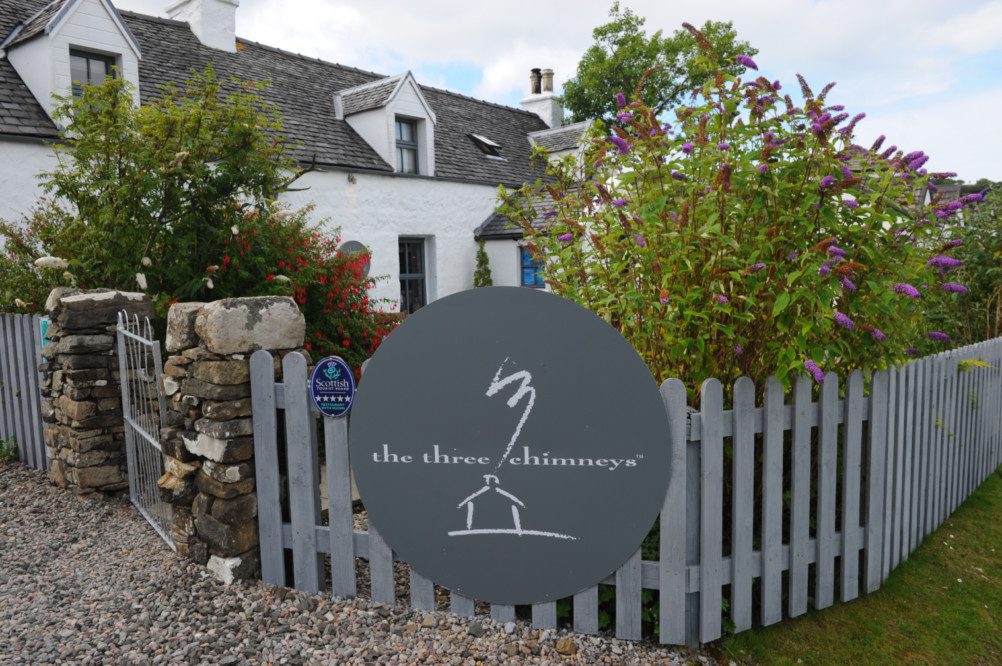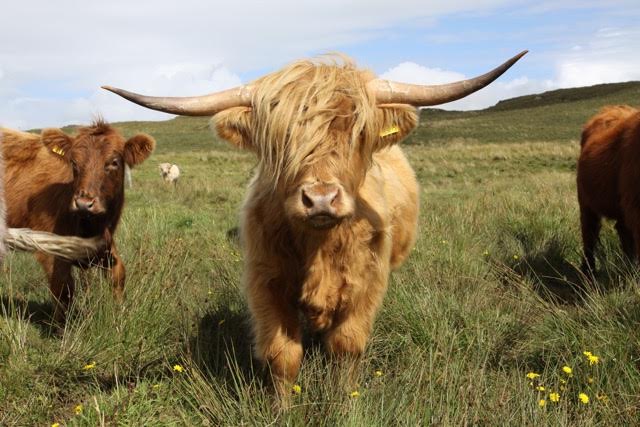
Scott Davies is the Head Chef at The Three Chimneys restaurant on the Isle of Skye, he enjoys a close relationship with Scottish suppliers, using locally sourced produce to create stunning dishes that enhance the restaurant's already glowing reputation as one of Scotland's best eateries.


The Three Chimney's Restaurant on the Isle of Skye. Picture: Robert Perry
Well, I think, not only for me, but the business as well, it's what makes us (the Three Chimneys) so special, the restaurant has been there 31 years, supporting the local community.
Orbost gives us access to some fabulous meat, from some fantastic natural breeds; you've got the Soay lambs, iron-age pork and then we have the local venison, which he shoots for us as well.
It's all slow growing, it's not force fed, it's all natural grazing and the animals are happy. The lambs are a bout a year and a half old and the pork is a year old too, and they are just allowed to mature naturally and the flavours are just incredible.
Regarding produce, probably every couple of days, and we try and stay ahead regarding the shooting, which is quite important for us too.
Orbost take the animals up to Dingwall for slaughter on the Monday, then collect it on the Tuesday and then they bring it back for us on the Thursday, and we collect it on the Friday morning.
The lamb only needs a few days hung, the mutton we usually hang for about a week in the chill at Orbost Farm, so we are always in contact.
Our menus change a lot, so it does fluctuate quite a bit between each week in terms of what we use, so they only kill what we need, so it's fresh as it can be and at the right maturity.
The Three Chimneys has built a foundation on Scottish Produce, importing really little. Since Shirley and Eddie have had the place they've always used Scottish produce.
At the moment, all of our shellfish, fish, meat and game is Scottish. We've got two great foragers as well, who forage all our mushrooms locally.
We also use three or four growers on Skye, so all of our veg and fruit is Scottish and in season; in the summer we get all the soft berries before moving onto pears and apples.
Realistically, all we use that is imported is dried goods. Everything else, all the main ingredients are from Scotland and all within 25 miles of the restaurant. The furthest we go for our fish is really Mallaig.
The climate helps, the cooler temperature slows everything down, especially the Scottish berries which are slow growing.
The waters around Skye are just absolutely fabulous, they are crystal clear and full of life. The shell fish and fish that are coming out of the water are just amazing and have great flavour.
Where we are helps, our shellfish comes from Dunvegan pier, which is a 15 minute drive away, so we collect them, they go straight from fisherman to chef and with an hour of it being caught its straight on the plate in the restaurant.
It affects the menu greatly, but only for good reasons.
On a beautiful summers day you might get some courgettes turning up at 4 in the afternoon and they are on the menu that night.
We get people walking in all the time - local crofters as well - with produce, and it just goes straight on the menu.
The menus themselves are adapted obviously for the seasons but we don't always know what we are going to get, you know we get a bounty every day, which is great for us.
It can hinder us as well though, because if the weather is bad and the boys can't get out to get the prawns, we don't go anywhere else, they just don't go on the menu.
At the moment all of our tasting menus use quite a lot of what Orbost supplies, we do have a lovely lamb and mutton dish though.
To make it we braise the mutton down, the neck and shoulders, then cook that nice and slowly for about 8 hours, then we flake all that down then roll it in potato, then crisp it up.
The lamb loins are pan fried - cooked nice and pink - then glazed in miso and heather honey before being served with some local courgettes (courgette puree) and a beautiful lamb sauce.
Rachael and husband Keith Jackson own and run Orbost Farm on the Isle of Skye, where they farm highland cattle, native breed sheep, including soay sheep and Hebridean sheep, and iron age pigs. They produce Lamb, Mutton, Pork, Beef and Wild Venison through their deer larder, which they sell directly to the public, local restaurants and hotels.


Rachael and Keith farm Highland cattle, as well some native breeds of sheep and iron-age pig. Picture: Orborst Farm
We are communicating at least two or three times a week with them on what they are going to need that week and what they are going to need the week after usually too.
We are continuously liaising with them on what produce they are going to take and when we need to get it ready for them.
We are essentially farmers that's what we do, but we also take our meat from the farms that step further, and so as well as being full time farmers we also do meat processing.
We aren't processing all the time though, as we aren't butchers, so we need to plan with them and also the others we supply, on how much they are going to need when they are going to need it, what their projections are and what their menu changes are going to be.
So, we do work incredibly closely with them to make sure they have everything they are going to need to satisfy their customers.
The way it works with us just now, there is no abattoir on Skye - in fact there is no abattoir anywhere near by - so although the animals are born and raised and processed on the farm they have to go to Dingwall to be switched off as that's the nearest abattoir.
We have been pushing really hard for a local abattoir to be built, a community one on the island, but at the moment, Keith will take our animals through to Dingwall on a Monday and then he will drive back to Kyle with the refrigerator van to bring the whole carcasses back to farm, and then we have a deer larder that's licensed for processing meat - we do wild venison as well - we then break the carcasses down and cut and package them and label them in the deer larder.
Scott in particular, takes whole carcasses, so he'll meet up with us on the Thursday and he will select the lamb or mutton carcasses that he needs, which works really well for us because it means he is able to cut and process that the way that he wants it done. Other things like the venison or the pork that they need, we do that for them.
I think it is very important, particularly for the tourist market, which is generally the main market for establishments like the Three Chimneys, to feed people the food that is produced in the region that they are staying in.
It's not only important for the environment, it's also important for the quality and for the traceability.
People quite often come here and say, 'Oh, right this is where my dinner from the other night came from'.
They can associate the two and understand the quality and the level of care that goes into producing what they ate. We call it food with an identity, it's essential to have that food that's traceable as you know the quality is there because someone is accountable for it.
You can't get away with cutting corners - not that we would - you can't get away with anything like that because you are the face of your produce, people know where it comes from and they know how it's being produced and it really does do justice to what we produce.
Oh definitely, because you know you've got the simplest production in doing it and you've also got the identity and traceability and because you have those, you by default, have the quality there as well.
We are a small business and you we can't afford to not put out the highest quality produce because we are the face at the end of it.
A lot of supermarket produce is faceless, there is no immediate repercussions if there is an issue.
Whereas with us there would be, so we make sure there is never an issue, so that kind of identity and traceability drives higher quality produce.
The great thing for us is when we work with local chefs, people like Scott who are so passionate about working with the seasons and working with us as producers, the amazing thing is that you know how much love and care you've put in to take it to the raw stage, the product stage.
And then with the Three Chimneys you know how much care and attention they are going to put into it to it to make it the best that it can possibly be, which justifies the whole process, because you know when it reaches the customer it is the best quality it can be.
That is extremely satisfying for everyone involved in the process, from producer to chef to customer, it means that everyone knows they've done the very best to do that animal justice.
That's what it is all about we wouldn't do it otherwise, that's why we do it.